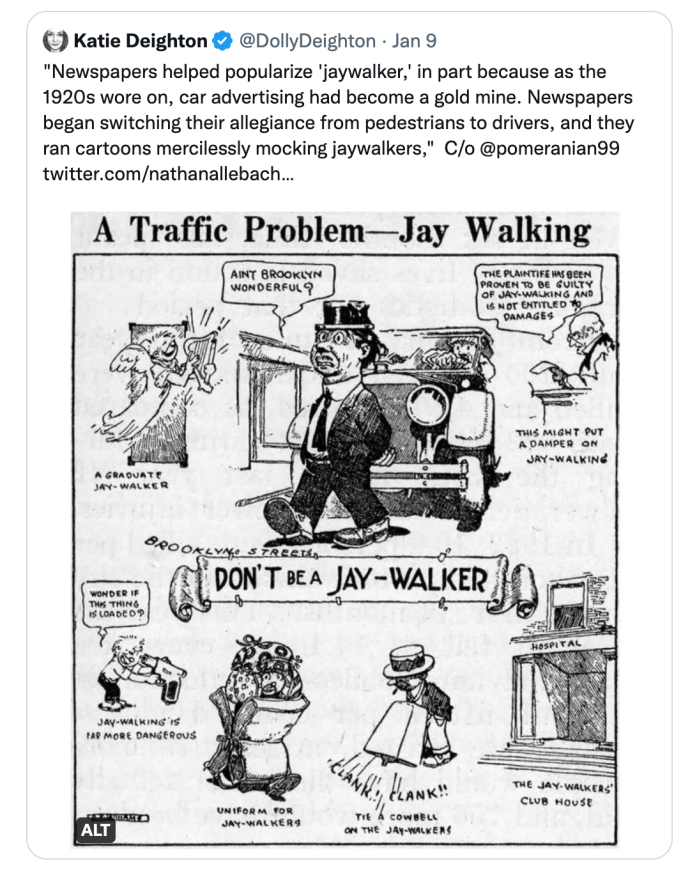
Everyone wants to stay safe on the roads. Unfortunately, there are wildly different ideas about how that’s best achieved.
Beaonisation is a digital version of the red flag they waved ahead of early cars* – except this time it’s for cyclists. If you think fitting pedestrians and cyclists with transponders to prevent them being run over in the brave new world offered by driverless cars sounds like back-to-front road safety, not to mention a little dystopian, prepare yourselves for some next-level, high-tech victim blaming.
When in doubt, blame the victim
Never let it be said that victim blaming by the car lobby hasn’t moved with the times. Cars in 1920s America were a relatively new phenomenon, and the public reacted to a soaring toll of road deaths with natural outrage. Newspapers labelled killer drivers as ‘remorseless murderers’ and likened the threat they posed to an epidemic disease. In Detroit, angry mobs would drag dangerous drivers from their cars.
Car makers tackled a looming PR disaster head on, spinning the story that pedestrians hit by cars were guilty of the newly-coined offence of jaywalking. A culture of victim blaming was born, and a fallacy that road deaths are unavoidable accidents by drivers persists to this day.
 With a new century has come a new challenge for car makers.
With a new century has come a new challenge for car makers.
Autonomous vehicles will bristle with sensors and cameras, but the tech is far from fool-proof when it comes to spotting people and bicycles.
How will the driverless cars of the near future recognise and avoid cyclists and pedestrians? The answer offered by the car industry’s perspective is simple. Put place responsibility on vulnerable road users.
Unfortunately, it appears the cycle industry seems all too keen to play along. Electronics company Bosch, Audi and bicycle companies including Shimano and Trek have joined forces to lobby for proximity beacons spottable by cars equipped with sensors, according to Forbes. These calls for so-called beaconisation once again place responsibility for safety on the victim – a topic touched upon in our documentary Stop Killing our Children.
Perhaps the most concerning aspect of beaconisation, is what it means for those without properly functioning proximity beacons.
* following publication we were contacted by Carlton Reid, who wrote the Forbes piece we link to above, with this interesting correction: All good arguments … except the red flag bit. No early cars were ever slowed down by a red flag. That law was repealed about six years before creation of first cars and about 20 years before the so-called “Emancipation Act”. It was propaganda spread by pioneer motorists.
The ethical choice
The ETA was established in 1990 as an ethical provider of green, reliable travel services. We continue to offer cycle insurance , breakdown cover and mobility scooter insurance while putting concern for the environment at the heart of all we do.
The Good Shopping Guide judges us to be the UK’s most ethical provider.

DaftPunct
Typo in first paragraph.
The ETA
Can’t spot it – please be more specific
John Stables
Fascinating….and terrifying
Paul Lovatt-Smith
I see so many potential benefits with driverless cars that having to wear a beacon in the earliest days of the technology may be worth it.
Richard
Nope, makes a lot of sense.
Many many cyclists do not have good road positioning, put themselves in poor positions and make reckless decisions that compromise their own safety.
I speak as a cyclist, motorcyclist, car driver and van driver.
I’m all for beacons if they help protect cyclists from themselves.
Jonathan Warren
Our choices are becoming more and more dictated by technology which rarely ever works as intended! All it does is create more problems (that are not necessary) to fix, so tech companies and bike manufacturers can take more money from us. For me cycling is an escape, its about freedom, your legs turn the peddles and the wheels rotate via a chain, its simple.
Sarah
What about those pedestrians and cyclists who can not afford beacons?